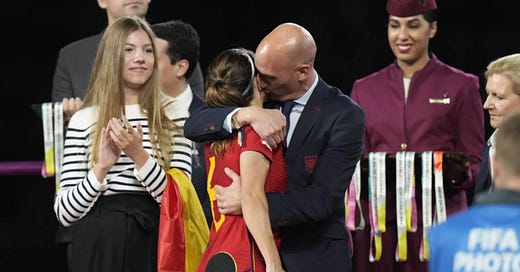Feminist consensus gathered predictably around the Spanish Kiss imbroglio, in which Spanish footballer Jenni Hermoso filed a criminal complaint of sexual assault and forced the resignation of Luis Rubiales, president of the Spanish Football Federation following his unsolicited World Cup victory kiss.
That's right. Criminal charges for a kiss—a mere peck—and feminists are still complaining about the injustice to women!
This consensus was given vivid expression in Washington Post columnist Candace Buckner’s op/ed “Jenni Hermoso is a giant. Only an unjust system reduces her to victim,” in which Buckner argued, ludicrously, that Hermoso has been doubly harmed, first at the hands of the odious Rubiales, who “placed his greasy paws on her face and pulled her in to that kiss” and then by the wall-to-wall news coverage afterwards, in which she has been compelled to “take on a new identity. One that never should have belonged to her: ‘Victim.’”
There’s a ring of familiarity here from decades of feminist advocacy, which has held that rape victims are doubly victimized: once during the sexual assault and again when they have to tell their story in public or on the witness stand, answering degrading questions about consent and facing the skepticism of some listeners. (Many victims feel “disbelieved” by a system that grants rights to the accused, and feminists in consequence have called for special courts and judicial training that would “Start by believing.”)
But there has been such a tremendous chorus of support for Hermoso—with teammates and players across the world, including many high-profile male players, as well as Federation officials and Spanish politicians, falling all over themselves to denounce Rubiales as a cad (every man seeing his own head on the chopping block if he fails in righteous indignation)—that the “doubly victimized” motif has been difficult to deploy. Even Rubiales’s uncle has denounced his kin, stating that most of the family stands with his accuser. Therefore, a different indignity has had to be summoned—in this case that Hermoso’s success on the football field has allegedly been eclipsed by the drama engulfing her.
“In the weeks since the championship match and the celebration that soiled Spain’s defining moment,” Buckner wrote, “the fallout has offered a glimpse into why it’s so hard for some alleged victims to seek justice.” Googling Hermoso’s name, one discovers that “Hermoso’s accolades are buried beneath an avalanche of stories documenting the fallout from the unwanted kiss,” and Hermoso’s face “has become synonymous with victimhood.”
Some victims refuse to “seek justice,” it appears, because of the outpouring of sympathy and indignation that may follow!
It’s hard to believe that the story’s playing out more quietly would have pleased feminist commentators or Hermoso herself, who publicly declared herself a vulnerable victim of sexism. And it’s impossible to see Hermoso as a hapless pawn in the unfolding drama. She seems, on the contrary, to have scripted her role adeptly, playing her audience like the pro she is, and her achievements—the immolation of Rubiales’s career and her elevation as a noble woman warrior—are worth dozens of dramatic on-field dives.
Even anti-male stalwarts like Susan Brownmiller or Andrea Dworkin might have been surprised by the near-universal insistence that a man should be criminally investigated and face up to four years in prison for an “assault” that, while it was happening, looked so much like innocent high spirits that all observers wore broad smiles. Commentators like Buckner pass over in silence the video showing Hermoso jubilating with her teammates after the event, looking exactly like a woman pleased and excited by all the attention. If pressed, feminist commentators can retort (as does Sophie Gallagher for INews here) that “Hermoso failing to live up to your expectations of how a victim should behave doesn’t stop her being right.” But when the argument is that harm occurred, the high spirits definitely undermine easy belief.
According to feminist trauma theory, anything appearing like enjoyment, excitement, insouciance, or bawdy jollity is to be understood as the assault victim’s pained attempt to normalize, and thus relieve, the horror of the occurrence (it’s a theory that, in the process of eliding the difference between rape and a kiss, grants uncontested authority to women to determine the meaning of any male-female interaction).
From a feminist point of view, then, Hermoso’s un-victimlike braggadocio suggests nothing more (nor less) than the girding of the loins needed by the “fearless goal scorer, emboldened speaker, and all-around jefa [boss]” to admit her vulnerability in that moment, a vulnerability she has so often surmounted on the football field that she may not have recognized it while the “assault” was occurring.
It’s convoluted, yes, but it’s now an entrenched part of the feminist rationale.
And despite the classic “poor me” stance she soon enough adopted, we are still to believe that Hermoso wanted none of it: didn’t want the world to feel sorry for her, didn’t want to be “thrust into a spotlight not of her own choosing and turned into the woman who had something done to her,” according to the always credulous Buckner. The takeaway is that Hermoso is speaking out for all women only at grave personal cost.
It is quite possibly the biggest load of feminist nonsense ever to be generally acclaimed.
The truth is that if Hermoso had not wanted to play the victim, she could have responded to Rubiales’s allegedly unwanted kiss in various low-key but effective ways. She could have waited a couple of weeks before mentioning it in order not to overshadow the victory celebrations. She could have acknowledged that the kiss occupies a grey area, that both women and men at times touch without consent. She could have made a joke about it. She could have called for a new code of conduct at professional sporting events. She definitely could have declined to demand Rubiales’s resignation or to have charges pressed against him, simply making clear, if she really wanted, that kissing on the mouth at public events should be avoided.
It would have been particularly humane if she had acknowledged, as Heather Mac Donald details, that the entire Spanish team was overcome with celebratory joy and doing silly, exuberant things to show it.
Instead, she turned a closed-mouth peck on the lips into an occasion for victim-politics of the most trivial and self-serving kind, with the penalty for Rubiales far out of proportion to the gravity of his offence (if offence it even was). In the process, she has shown herself cruel, self-infatuated, and power-mad—though understandably so, given that the feminist power to dictate reality (and to disguise viciousness as vulnerability) is a heady power indeed.
Notably, Hermoso has also shown the world that she found such victim-power far more significant and gratifying than the honest sports glory she might have embraced instead.
Far from a difficult decision, her choice to play victim seems to have been near-irresistible—as it is for so many women—with its manifold emotional and material benefits. In addition to the rush of moral purity and self-glorification, Hermoso’s accusation may well bring endorsements, lucrative speaking engagements, a possible book deal, and long-term star status regardless of what happens in her football career. It is salutary to see her make the choice so clearly.
As for Rubiales, he has so far remained unrepentant, which has increased the fury of his accusers. For feminists, it’s not enough to destroy a man; he must be brought to welcome his destruction and proclaim his repentance. I hope he will long deny them their satisfaction.





Compare this reaction to the grooming gangs in England, mass sex assault in Cologne, rape crisis in Sweden, Lola Daviet in France. Europeans only care about women when convenient for the narrative: https://yuribezmenov.substack.com/p/how-to-speak-french-part-2
Seriously though, after reading this the question still remains, why shouldn’t males consider MGTOW and stay as far away from this shit show as possible.
My guess is that if men didn’t pay attention to women’s sports (and pay for women’s sports) it’s a pass time that would shrivel on the vine anyway.
Rubiales not apologizing is perfect. Apologize for nothing is a time honored male tradition. St John Wayne is vindicated again!